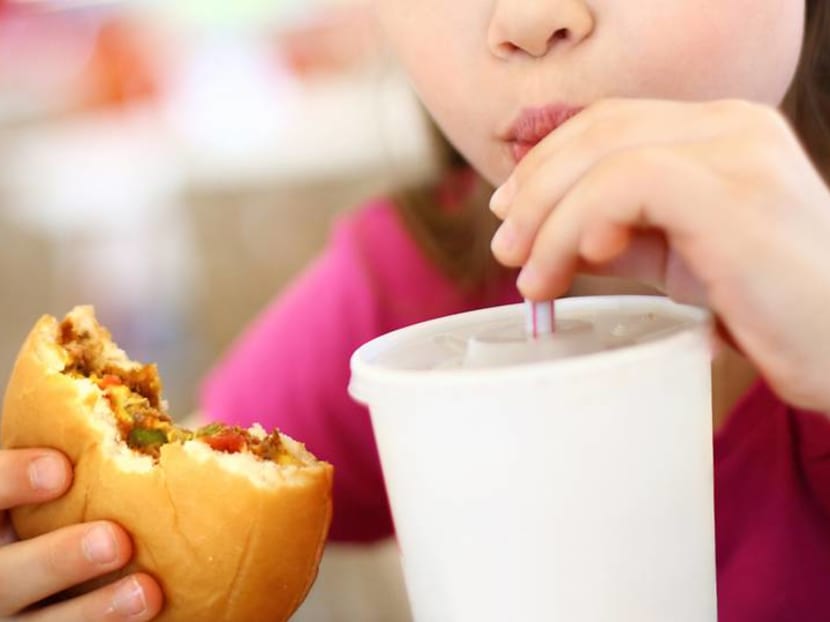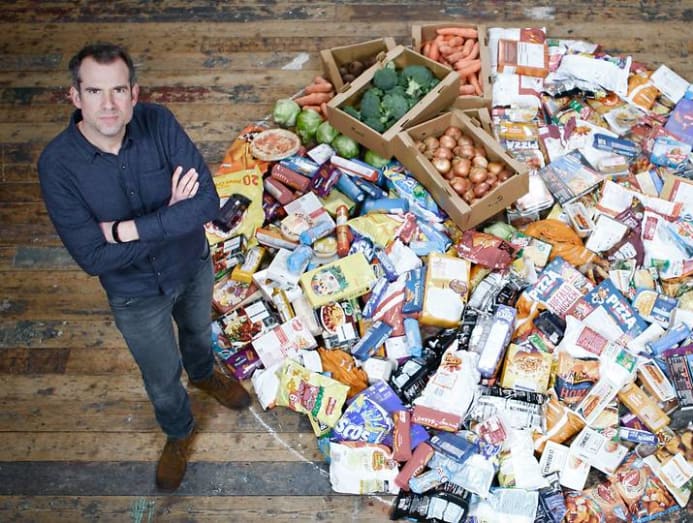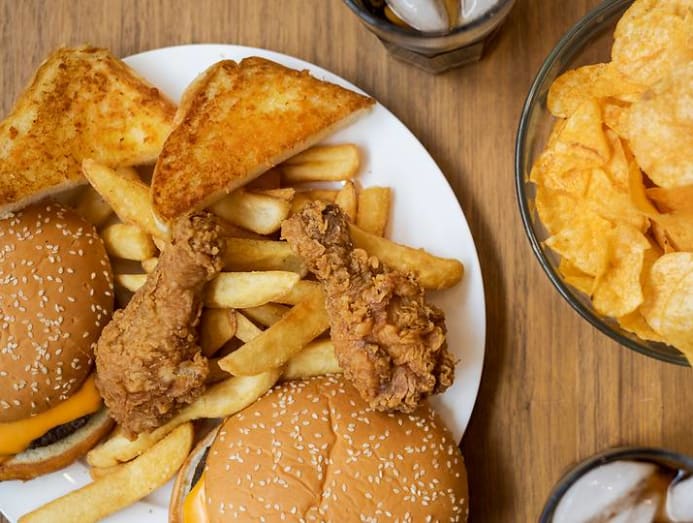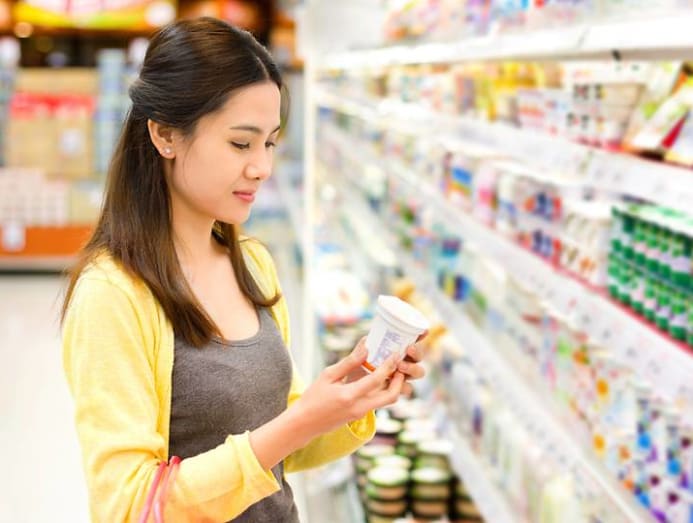What happens when you (and your kids) eat burgers, fried chicken for a month
UK doctor Chris van Tulleken ate ultra-processed foods for an entire month and told CNA Lifestyle about their damaging effects, including on women and children.

Dr van Tulleken recommends reducing your intake of ultra-processed foods such as hamburgers, breakfast cereal and supermarket bread to as little as possible. (Photo: iStock)
It’s cheap. It’s quick. It’s convenient. And worse, it’s addictive.
We’re talking about ultra-processed foods – potato chips, hamburgers, cereal, ready-made pizza and the like – the stuff that’s pretty hard to resist.
With dining-in being off the table until after Aug 18 as Singapore goes back to Phase 2 (Heightened Alert), these foods may become even harder to resist. It's likely that you'll be ordering in more or falling back on ready-made frozen meals as a default, many of which are ultra-processed.
When infectious disease expert and medical researcher Dr Chris van Tulleken found there was little research on the impact of an ultra-processed diet on one's health, he embarked on a self-experiment to find out just how damaging such foods were on our health, especially in children. The findings were documented in the feature What Are We Feeding Our Kids, on BBC Earth.

For four weeks, the father-of-two ate ultra-processed foods such as fried chicken, hamburgers, pizza, which made up 80 per cent of his diet, up from 30 per cent pre-experiment.
Although the initial plan was to only eat three meals a day (plus the occasional snack), the 42-year-old found that he became hungry much more easily. He attributed this to the fact that ultra-processed foods tend to have a softer texture, making them easier to chew and digest, driving him to eat more.
In a video interview with CNA Lifestyle, Dr van Tulleken shared that ultra-processed foods make up 60 per cent of the average diet in the United Kingdom. That amount was higher in children, with many eating a diet made up of 80 per cent to 90 per cent ultra-processed foods.
“Families depend on it. It’s like saying, what’s the maximum number of cigarettes you should smoke or the maximum number of beers you should drink? The answer to that is, as little as possible,” he said.
READ: Can drinking coffee help you live longer? Studies show it has health benefits
Are ultra-processed foods really so bad? The short answer is: Yes.
It has almost no real function, Dr van Tulleken said, except that it’s cheap and it does contain calories (even if it doesn’t contain nutrition).
Ideally, he advised that if we have the time, finances and skills, we should eat none of it.
WHAT ARE ULTRA-PROCESSED FOODS?
There is a smarter way to identify healthy food, said Dr Christopher Millet, Professor of Public Health at Imperial College London, in the same documentary.
Instead of thinking of unhealthy food as those with high levels of fat, sugar and sodium, you should look at the NOVA food classification system developed by researchers at the University of Sao Paulo in Brazil. This categorises food into four groups in order of their level of industrial processing.

Group 1: Unprocessed foods. “Natural” or minimally processed foods such as fruits, vegetables, eggs and milk.
Group 2: Processed culinary ingredients. Ingredients that you can cook with or to flavour food in Group 1, such as oil that has been extracted from plants, or sugars that have been refined.
Group 3: Processed foods. These have gone through more processing to preserve them or increase their flavour, such as ham, bacon, smoked fish and cheese.
Group 4: Ultra-processed foods. These have gone through many levels of processing and include additives to improve texture and whet the appetite; such foods range from chicken nuggets to frozen chips, ready-made pizzas and many types of cereals.
THE HEALTH COSTS OF AN ULTRA-PROCESSED DIET
The results of the month-long experiment were alarming: Dr van Tulleken said he felt sluggish, felt about 10 years older, had poor sleep, suffered from constipation, gained 6.5kg in the four weeks (which pushed his weight into the overweight range), had a visible increase in man boobs, and suffered a decrease in libido.
He also said that he was a lot more anxious generally, adding in the interview that the short-term effects of a high ultra-processed diet are linked to depression and anxiety.
In the documentary, Dr van Tulleken worked closely with Rachel Batterham, Professor of Obesity, Diabetes and Endocrinology at the University College London and one of the UK’s leading experts in childhood obesity. He wanted to understand the changes in his body, which showed up in a blood test, brain scan, and in physical changes such as his weight, body mass index and body fat.
Eating a diet full of ultra-processed foods had the effect of altering his hormone levels. While the “hunger” hormone (ghrelin) in his blood went up by 30 per cent (which explained why he felt hungry more often), he also saw a decrease in the “fullness” hormone (leptin), which signals to the brain that you’ve eaten.
His brain scan wasn’t much better. It revealed “the most appalling medical result” he says he has ever had, showing a significant effect on his brain that could be likened to taking substances like cigarettes, alcohol and drugs.
Comparing Dr van Tulleven’s pre- and post-experiment brain scans in the documentary, Prof Batterham pointed out “new functional connections” in the brain that weren’t there previously, suggesting an automatic or repetitive behaviour often seen in addiction.
That means, said Dr van Tulleken, eating ultra-processed foods becomes something your brain tells you to do even without you wanting it.
HOW IT CAN AFFECT CHILDREN
Said Dr van Tulleken: “If in four weeks it could do that to my 42-year-old brain, what is it doing to a fragile developing brain?” referring to the potential effects on children.
Poor eating habits and the increasing availability of ultra-processed foods seem to be the culprit behind the quick and steady rise in childhood obesity.
In the documentary, Dr van Tulleken pointed out that each generation over the last 50 years has been heavier than the last. “What we do know is that Sasha and Lyra (his two children) are three times more likely to be overweight when they are teenagers than I was.”
He added that 80 per cent of teenagers with obesity go on to suffer the health effects of obesity as adults.
READ: Can drinking a cup of bubble milk tea a day lead to gout?
“We are going to see cohorts of children with a lifetime of ill health. That alone should ring alarm bells,” said Dr Shaw Somers, consultant surgeon at the Queen Alexandra Hospital in the UK. The real problem, he said, was the ready availability and vast quantities of heavily industrialised foods.
According to Dr van Tulleken, more experts now believe we’ve been underestimating the impact of ultra-processed foods on childhood obesity.

In a secondary school in Brazil, a teacher named Paula shared in the documentary that there had been a rise in diabetes, obesity and high cholesterol in children as young as seven years old. She said: “We used to have lots of fish, shrimp, red meat, chicken, and everything was fresh. But eating habits have changed.”
Brazilian obesity rates have increased by more than 150 per cent from 2002 to the present, with children with poor diets suffering from poor health.
THE POTENTIAL EFFECTS ON WOMEN
While the documentary focused its findings on children (and its effects on Dr van Tulleken as an adult), we were curious about its effects on women, especially when it comes to hormone levels.
Dr van Tulleken shared during the interview that ultra-processed foods have an effect on fertility, especially in women, although scientists don’t know how it affects our reproductive and other hormones.

“What we do know is that fat is a hormonal organ that metabolises hormones and alters it. So as eating ultra-processed food causes us to gain weight, our hormone levels will change,” he said.
He suspects that this has a very significant effect on fertility, even as there’s greater awareness about the falling fertility rates worldwide that, in part, have to do with the plastics used to wrap ultra-processed food.
WHAT SHOULD FAMILIES DO TO REDUCE INTAKE OF ULTRA-PROCESSED FOODS?
“Many families in Singapore still have a very strong culture of traditional diet, which is great,” Dr van Tulleken told CNA Lifestyle. “I think part of it is clinging on to the recipes and traditions that our parents and grandparents maintain to teach our children those skills.”
Though cooking takes time and uses energy, Dr van Tulleken shared that it’s about prioritising and reserving your time to cook, by taking time away from TV and other things. “Even if you make food with sugar, salt, oil and others, it’s still perfectly good for you,” he said.
READ: All about carbs: 10 white rice alternatives to consider (that’s not brown rice)
WHAT TO DO WHEN SHOPPING AT THE SUPERMARKET
Dr van Tulleken’s rule of thumb: “If the food is in a plastic wrap, and it has one ingredient that you don’t usually have in your kitchen, such as xanthan gum or soy lecithin, the emulsifiers, the stabilisers, glycerol, glucose syrup, these ingredients are probably ultra-processed.”
And any food with a health claim on it (even if it appears to be healthy), is probably ultra-processed, too. “So most bread in the supermarket, almost all breakfast cereals, most yoghurt, almost all snacks, chips and almost anything that is frozen like ice cream, it all contains these ingredients,” said Dr van Tulleken.
So what should we eat for breakfast then? His answer: “Oats porridge is good! Children (and humans) should only drink water or milk.”

If you are a fan of fruit juices, Dr van Tulleken suggests eating the fruit instead of juicing it. “Fruit juice is just like a soft drink. The good of the fruits is the chewing of the pith. Once you pulverise it, though it’s not ultra-processed, it’s not useful. And it’s very bad for your teeth – it’s acidic.”
CHANGING MINDSETS
One of the most compelling scenes in the documentary was Dr van Tulleken’s exploration of the “world’s only floating supermarket” set in a remote riverside community in Brazil, whose mainly poor residents needed help in getting access to quality food. When ultra-processed foods were introduced, there was a significant spike in the number of children with obesity, tooth decay and more.
There are two important policy-oriented solutions to this, Dr van Tulleken told CNA Lifestyle: “You need to label ultra-processed food, and then you need to ban the marketing of the food, especially to children. So you treat it like cigarettes.
“One of the most important solutions is also changing our understanding of people with obesity as being weak-willed and a personal problem. Obesity is a disease caused by companies, and it’s not a failure of people’s character,” he said.
You can watch What Are We Feeding Our Kids here on BBC Player.





